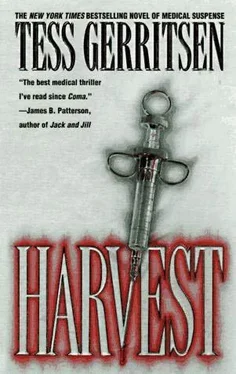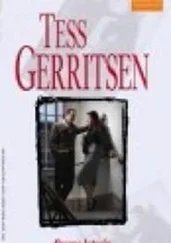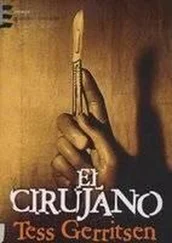"Lot of blood pooling in here," said Archer. "Suction, Abby." The hiss of the suction machine gave way to a tense silence as the surgeons worked more quickly now. There was only the whir of the pump-oxygenator and the click of the needle clamps as the serrated jaws snapped shut with each new stitch. Despite Abby's repeated suctioning, blood kept soaking into the drapes and dribbling onto the floor. The towels at their feet were saturated. The surgeons kicked them aside and new towels were thrown down.
Archer snipped away the suture needle. "Right atrial anastomosis done."
"Perfusion catheter," said Mark.
A nurse handed him the catheter. He introduced it into the left atrium and infused four-degree-centigrade saline. The flood of chilled liquid cooled down the ventricle and flushed out any air pockets inside.
"Okey doke," said Archer, repositioning the heart to sew the aortic anastomosis. "Let's hook up these pipes."
Mark glanced up at the wall clock. "Look at that. We're ahead of schedule, folks. What a team."
The intercom buzzed. It was the OR desk nurse. "MrVoss wants to know how his wife is doing."
"Fine," called Archer. "No problems."
"How much longer, do you think?"
"An hour. Tell him to hang in there."
The intercom shut off. Archer glanced across at Mark. "He rubs me the wrong way."
"Voss?"
"Likes to be in control."
"No kidding."
Archer's suture needle curved in and out of the glistening aortic wall. "But then, I guess if I had his money, I'd call the shots too."
"Where does his money come from?" asked the fifth-year resident.
Archer glanced at him in surprise. "You don't know aboutVictor Voss? VMI International? Everything from chemicals to robotics."
"Is that what the V stands for in VMI?"
"You got it." Archer tied off and snipped the last suture. "Aorta done. Cross-clamp off."
"Perfusion catheter coming out," said Mark, and turned to Abby. "Get those two pacing wires ready for insertion."
Archer picked up a fresh suture needle from the tray and began the pulmonary anastomosis. He was just tying off when he noticed the organ balling up. "Look at that!" he said. "Ice cold and already a spontaneous contraction. This baby's rarin' to go."
"Pacing wires on," said Mark.
"Isuprel infusion going in," said Zwick. "Two microgrammes."
They watched and waited for the Isuprel to take effect, for the heart to repeat the contraction.
It lay inert as a limp sac.
"Come on," said Archer. "Don't let me down."
"Defibrillator?" asked a nurse. "No, give it a chance."
Slowly the heart tightened into a fist-sized knot, then fell flaccid. Zwick said, "Increasing Isuprel to three mics." There was one more contraction. Then nothing. "Go on," said Archer. "Flog it a little more."
"Four mics," said Zwick, dialling up the IV infusion.
The heart tightened, relaxed. Contracted, relaxed.
Zwick glanced up at the monitor. QRS spikes were now tracing across the screen. "Rate's up to fifty. Sixty-four. Seventy…" "Titrate to one-ten," said Mark.
"That's what I'm doing," said Zwick, adjusting the Isuprel.
Archer said to the circulation nurse: "Get on the intercom, will you? Tell Recovery we're about to close."
"Rate's one-ten," said Zwick.
"OK," said Mark. "Let's take her off bypass. Get those cannulae on."
Zwick flipped on the ventilator. Everyone in the room seemed to exhale a simultaneous sigh of relief.
"Let's just hope she and this heart get along," said Mark.
"We know how close the HL-A match is?" asked Archer. He turned around to look at Dr. Mapes.
There was no one standing behind him.
Abby had been so focused on the operation, she hadn't noticed the man had left.
"He walked out twenty minutes ago," one of the nurses said. "Just like that?"
"Maybe he had a plane to catch," she said.
"Didn't even get a chance to shake his hand," said Archer. He turned back to the patient on the table. "OK. Let's close."
Nadiya had had enough. All the whining, all the demands, all the pent-up boy energy that regularly erupted into swearing and shoving, had sucked away her strength. That, and now the seasickness. Gregor, the big ape, was sick as well, as were most of the boys. On the roughest days, when the ship's hull pounded like a hammer on the anvil of the North Sea, they all lay groaning in their bunks, the sounds and smells of their wretchedness penetrating even to the decks above. On such days, the mess hall below remained dark and half-deserted, the passageways were empty, and the ship was like some great and moaning ghost vessel, guided by the hands of a spirit crew.
Yakov had never had such a good time.
Unstricken by even the faintest twinge of nausea, he roamed freely throughout the ship. No one stopped him. Indeed, the crew seemed to enjoy his presence. He would visit Koubichev in the engine room, and in that noisy hell of grinding pistons and diesel fumes, the two of them played chess. Sometimes Yakov even won. When he got hungry, Yakov would wander into the galley where Lubi the cook would offer him tea and beet soup and medivnyk, the fragrant spiced honey cake from his native Ukraine. Lubi never said much. "More?" and "Enough, eh?" was the extent of his conversation. The food he served was eloquence enough. Then there was the dusty cargo hold to explore, and the radio room with its dials and knobs, and the deck with its tarp-covered lifeboats to hide in. The only place he could not wander was the far-aft section. He could not find any passage to get in there.
His favourite place of all was the bridge. Captain Dibrov and the navigator would greet Yakov with indulgent smiles and allow him to sit at the chart table. There he'd trace with the index finger of his one hand the course they had already sailed. From the port of Riga, down the Baltic Sea, through the channel past Malmo and Copenhagen, around the top of Denmark, and across the North Sea with its stepping stones of oil platforms with names like Montrose and Forties and Piper. The North Sea was bigger than he'd imagined. It was not just a little puddle of blue, the way it seemed on the chart. It was two days of water. And soon, the navigator told him, they'd be crossing an even bigger sea, the Atlantic Ocean.
"They won't live that long,"Yakov predicted.
"Who won't?"
"Nadiya and the other boys."
"Of course they will," said the navigator. "Everyone gets sick in the North Sea. After a while their stomachs settle. It has to do with the inner ear."
"What does the ear have to do with the stomach?"
"It senses motion. Too much motion makes it confused."
"How?"
"I don't really understand it. But that's how it works."
"I'm not sick. Is there something different about my inner ear?"
"You must be a born sailor."
Yakov looked down at the stump of his left arm and shook his head. "I don't think so."
The navigator smiled. "You have a good brain. Brains are far more important. You will need them, where you're going."
"Why?"
"In America, if you're clever, you can become rich. You want to be rich, don't you?"
'! don't know."
Both the navigator and the captain laughed.
"Maybe the boy doesn't have any brains after all," said the captain. Yakov looked at them without smiling. "It was just a joke," said the navigator. '! know."
"Why don't you ever laugh, boy? I never see you laugh."
"I never feel like it."
The captain snorted. "Lucky little bastard's going to some rich family in America. And he doesn't feel like laughing?What's wrong with him?"
Yakov shrugged and looked back at the chart. "I don't cry, either."
Aleksei was curled up on the lower bunk, clutching Shu-Shu to his chest. He was startled awake as Yakov sat down on the mattress. "Aren't you ever going to get up?" askedYakov. Aleksei closed his eyes. "I'm sick."
Читать дальше












